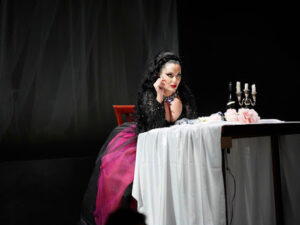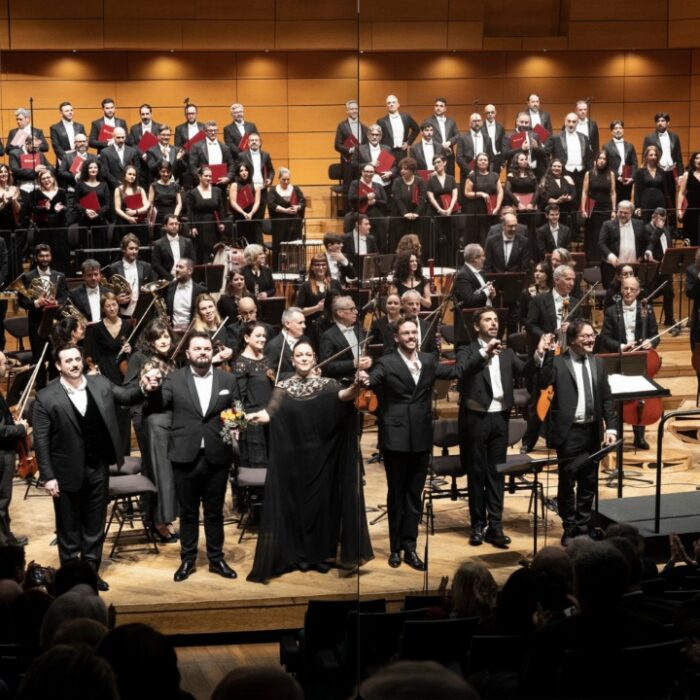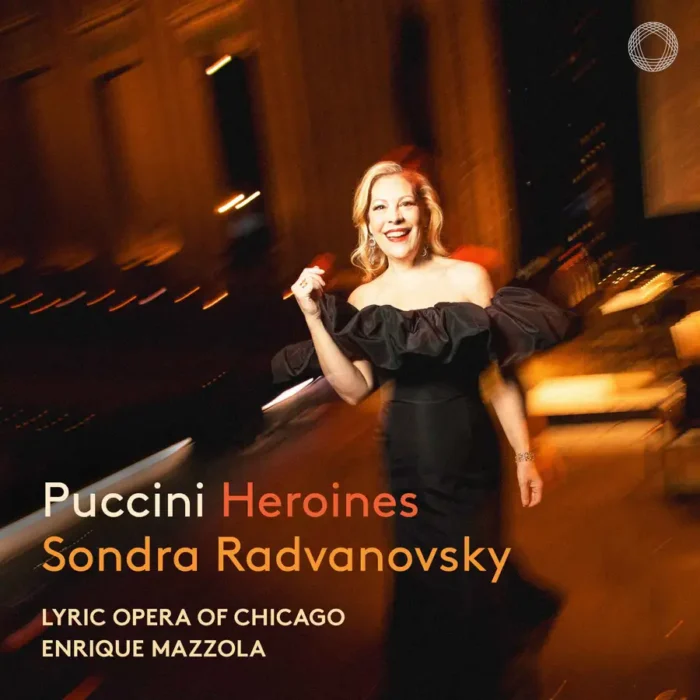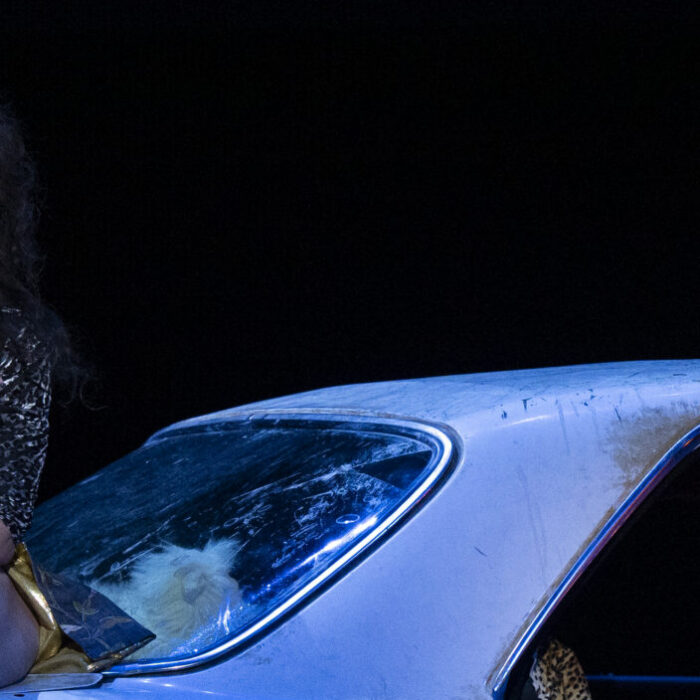
Rossini Opera Festival 2024 Review: Ermione
Stunning Singing From Juan Diego Flórez, Anastasia Bartoli & Enea Scala
By Alan Neilson(Photo: Amati Bacciardi)
“Ermione” managed only seven performances when premiered at Naples’ San Carlo in 1816 before being shelved. It had to wait until 1987 to be revived, when it received its first modern staging at the Pesaro Rossini Opera Festival. Since then, it has had numerous performances, with each adding to its reputation as one of the composer’s most accomplished tragedies. This summer’s production at the Rossini Opera Festival further added to the opera’s standing with a series of splendid performances, in which its stellar cast, under the musical direction of Michele Mariotti, produced a masterclass in bel canto singing.
The drama revolves around a complex web of love relationships, in which the egos of Pirro, Ermione and Orestes propel it towards a calamitous conclusion, leaving one person dead, another fleeing for his life, and the other emotionally broken. They are at the mercy of their passions and act impulsively in whatever way suits their ends: making and breaking promises, manipulating, threatening, lying, and bullying each other, even using the child, Astianette, as a pawn in their games. Only Andromaca, who is an unwilling victim, acts with any semblance of decency.
Imaginative & Colorful Staging
The director, Johannes Erath, opted for a vibrant staging, with the chorus playing an active role in keeping the drama alive. Even when not singing, it crowded the stage, almost encouraging the main players to take their reckless decisions. Its interest verged on the obsessive as if it were watching a soap opera. Erath ended his program notes with the following observation about the opera’s main characters: “society enjoys watching them attack each other, like beasts in the arena, just as happens today when we read scandal magazines.” And this is exactly what he presented on stage.
Erath also drew attention to the fact that each of the four main protagonists was being manipulated by a companion, which he regularly drew attention to through their body language and thus added another layer of interest to be enjoyed by the watching crowd.
Eros was also added to the mix to highlight the power of love in dictating human behavior. At significant moments, the god would appear to ensure his victims would follow their irrational passions. It was an effective device, although occasionally it came across as a bit heavy-handed, as at the end of Act one, where Eros fired his arrows from the edge of the stage, which were slowly passed from hand to hand by the chorus members until they reached their targets. It was so obvious and protracted that it distracted rather than illuminated.
The scenographer, Heike Scheele, created an imaginative stage design that functioned effectively in promoting Erath’s vision. The black stage was constructed to create three stage pictures, one within the other, delineated by white neon strip lights. Steeply raked steps connected the lower to the upper sections, which were frequently used by the chorus, to either look upwards when the main characters were eating or relaxing, or downwards onto the main part of the stage when the action was played out below. Occasionally, the steps would be used by the chorus to crowd closely around a character in an intrusive or demanding manner to ensure it was up close and able to get the full experience.
Although the stage is by no means lacking in space, Erath also felt the need to use the sides of the orchestra pit and the platform that ran along its front, sometimes with very positive outcomes, such as in the act one duet between Ermione and Pirro, in which Erath had them sitting either side of the orchestra to emphasize the emotional distance that separated them.
Jorge Jara’s elaborate costume designs were based on the punk and new romantic styles of the late 1970s and early 80s, which fitted neatly with the black-colored sets, and occasionally created mise-en-scènes that were reminiscent of pop videos of the period.
It all amounted to an imaginative and colorful backdrop, but one that also successfully promoted the central conflicting love interests along with its tragic outcome, for which Erath’s direction was sensitively crafted to manage the tensions and develop characterization.
Singing Excellence
The opera is dominated by its four principal roles for which the festival managed to attract four accomplished singers, three of which can only be classed as exceptional.
Following last year’s success at the festival in which she played the role of Cristina in the Rossini rarity “Eduardo e Cristina,” expectations were running high for soprano Anastasia Bartoli’s interpretation of Ermione. And she did not disappoint! Fully immersing herself in her character, Bartoli gave voice to the waves of extreme emotions that swept through her as she attempted to cope with Pirro’s attempts to discard her in favor of Andromaca before pressurizing Oreste into killing him, which she then instantly regretted, and on whom she then rained down insults. Time after time, she allowed her full-bodied voice to rip through the theatre as she raged at Pirro’s treachery, whom she could not stop loving. Hers is a formidable instrument, strong across the range with a natural lyricism and a wonderful agility that allows her to transition seamlessly between registers and unleash scintillating passages of coloratura. Her upper register has a real beauty, and when she pushes upwards, her voice opens up without any sense of insecurity and appears to glide over the line regardless of its complexity. The confidence and sensitivity with which she depicted Ermione were dramatically compelling.
In any other staging, Bartoli would have been the standout performance, but such was the quality of the singing from Enea Scala and Juan Diego Flórez, it was an accolade that she would have to share.
Flórez may no longer be the fresh voiced, young tenor that set him on the road to fame, but his singing still possesses a ravishing beauty and a wonderful expressivity, which he wasted no time at all in displaying with his opening cavatina, “Reggio abborita!” Engaging fully and confidently with the piece, he did not shirk from any of its challenges, unleashing spectacular passages of complex coloratura, taking audacious leaps in his stride and pushing his voice firmly and seamlessly into his upper register without compromising its beauty. He colored the line and added well-placed emotional emphases with ease. Yet, there was no affectation; everything was done to promote the honesty of the emotions. It was a breathtaking rendition and the audience’s response was deservedly enthusiastic. Throughout the evening, Flórez maintained a high level of consistency; whether singing numbers or recitatives, there was always a nicely crafted balance and beauty that underpinned his delivery, and the voice exhibited an impressive level of stamina.
One of the features that marks out Scala’s performances is his ability to bring a degree of mental instability or quirky malevolence into the portrayals of his characters, especially those who are clearly ill-intentioned, as was the case with Pirro. Despite his attractive and lyrically strong tenor, his skill in conveying evil intent and psychological damage through the use of strong and subtle accenting and dynamic and colorful contrasts enabled him to imbue the vocal line with the necessary levels of emotional unpredictability, in which one could clearly hear his frustrations, anger, protestations of love and sneering aggression, which he supported with his fine acting to magnify the effect. In addition, there often appears to be a competitive element to his performances, which infuses his singing with an energetic frisson that can electrify a scene, which was exemplified in his duet, “Non proseguir, comprendo,” with Bartoli. The two singers clashed head on, with both appearing determined not to be outdone by the other before eventually combining brilliantly, as their voices soared majestically above the orchestra.
The fourth principal singer, mezzo-soprano Victoria Yarovaya, cast as Andromaca, was never going to hit the same heights. Yet, she did herself proud with a convincing performance that captured her character’s emotional turmoil, as her son is threatened with death and then promised the throne, dependent upon her response to Pirro’s aggressive attentions. Yarovaya possesses a colorful, agile voice, which she used skillfully and expressively to present her feelings, most impressively in the duet, “Ombra del caro sposo,” for which she produced a controlled, forcefully sung rendition that reflected her inner anguish and determination to save her son.
All the minor characters were given strong performances. Bass-baritone Michael Mofidian made a strong impression in the role of Fenicio, in which his firm, secure and resonant singing caught the attention. Tenor Antonio Mandrillo as the supportive Pilade, mezzo-soprano Martiniana Antonie as Cleone, and mezzo-soprano Paola Leguizamón as Andromaca’s servant, Cefisa, all displayed sensitivity in their portrayals, while tenor Tianxuefei Sun put in an animated display as Attalo, in which he successfully played up the conspiratorial aspects of his character.
Marriotti Displays His Credentials as a Rossini Specialist
Two years ago, the conductor Michele Mariotti, in his program notes for the Aix-en-Provence festival’s production of “Moïse et Pharaon” stated, “as a conductor, I do not see myself as a Rossini specialist.” The performance, however, suggested otherwise, and further proof, if it is indeed necessary, was provided by the detailed performance he drew from the Orchestra Sinfonica Nazionale della RAI. Eliciting a reading with clear contours and beautifully defined textures, underpinned by a rhythmic sensitivity, he created a pleasing forward momentum that ensnared the audience. Musical tensions over the course of each act were expertly managed, which gave the music a cohesive strength that complemented perfectly the work’s dramatic aspects.
The Coro del Teatro Ventidio Basso, under the management of chorus master Giovanni Farina, made a splendid impression, acting and singing with plenty of energy and enthusiasm, in which its contribution, probably more than any other single on-stage entity, was responsible for making it such a visually lively and colorful spectacle.
It was an excellent production, in which all the elements played their full part. Such was the superb quality of the music making, however, it would be so easy to understate the contribution made by Erath’s staging. Yet it was his lively and imaginative direction that produced the necessary balance that kept the audience focused on the fact that they were watching a staged drama and not just attending a concert of extraordinary singing.



